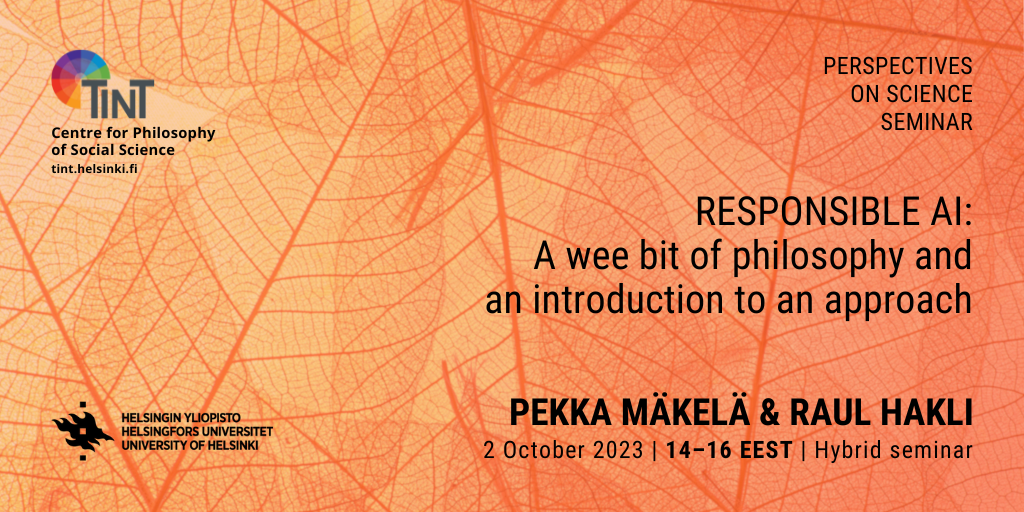
In the next Perspectives on Science seminar, Pekka Mäkelä (University of Helsinki) and Raul Hakli (University of Helsinki) will give a talk titled “RESPONSIBLE AI: A wee bit of philosophy and an introduction to an approach“.
The seminar takes place in person at Metsätalo and online via Zoom from 14:15 to 15:45 on Monday the 2nd of October 2023. To join the seminar, please contact jessica.north@helsinki.fi for the location or Zoom invitation.
Perspectives on Science is a weekly research seminar which brings together experts from science studies and philosophy of science. It is organized by TINT – Centre for Philosophy of Social Science at the University of Helsinki. More information about the seminar here.
Abstract:
The speed of progress in the development of automation, such as autonomously operating artificially intelligent systems and social and industrial robots is enormous. Algorithms and robots functioning and making decisions in areas that used to be controlled by humans alone, for instance, in stock trading, medical diagnosing, and car driving are becoming ubiquitous. This development is inspiring but also raising a lot of worries. One rather generic fear concerning increasingly autonomous systems has to do with responsibility. What happens to responsibility when technology is less and less in the control of human agents? In this talk we will discuss some of the worries concerning the societal risks brought about by autonomous machines focusing on moral and legal senses of responsibility. We distinguish between two ways of understanding responsibility in the context of AI: One that tracks the ideas discussed under the generic title responsibility of AI systems, and the other that tracks ideas discussed under the generic title of responsible AI.At the core of the former sense is the idea that we could captivate responsibility into a computer program and by that way bring about an artificial moral agent capable of bearing moral responsibility pretty much in the same sense as some human beings are considered to be morally responsible. This would provide us with a neat solution to the problem of responsibility gaps. We will critically evaluate the fruitfulness of this sense of responsibility and end up arguing in favor of an institutional interpretation of responsible AI. Here we are thinking about social and institutional structures that can be identified at least to an extent in terms of constitutive rules. Some such rules create social roles and positions which can be cashed out in terms of tasks. We would claim that structural institutional responsibility allocation on the basis of formal rules is the most promising approach to the problems of moral and legal responsibility created by autonomous systems. This leads us to study and evaluate the responsibility of human beings either individually, jointly, or collectively. In this context we will briefly discuss regulation and the value-sensitive design approach and introduce a down to earth way of contributing to the implementation of this sense of formalizing responsibility by way raising the institutional sensitivity to moral reasons.
Author bios:
Pekka Mäkelä in an ex-coordinator of TINT.
Raul Hakli is a university researcher in practical philosophy.
